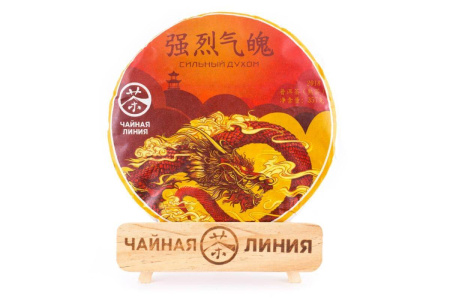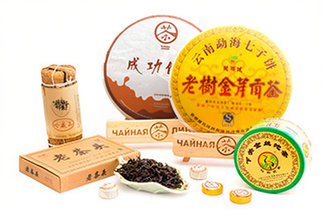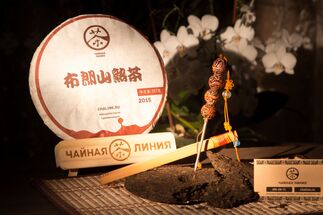-
0 Saturation
-
0 Aftertaste
-
0 Aroma
-
0 Effect
-
0 Balance
-
0 Body
Shu Pu'er 2023 "Strong in Spirit" from Tea Line: A Source of Strength and Inspiration
The 2023 Shu Pu'er "Strong in Spirit" (Chinese: 强烈气魄, pinyin: qiángliè qìpò) from Tea Line is a true gift for connoisseurs of deep, rich flavor and noble aroma. Aged for two years, this tea has acquired unique properties that will be appreciated by both novices and seasoned tea connoisseurs.
Origin and production
This tea is made from high-quality raw materials harvested in 2022 on the Yongde tea plantations in the Xishuangbanna Dai Autonomous Prefecture of Yunnan Province. This region is home to some of the finest tea leaf varieties used to produce shu pu-erh. The freshly picked leaves underwent traditional heap fermentation and were pressed into cakes in 2023. This production method gives the tea its characteristic rich flavor and aroma.
Taste and aroma
When dry, the pu-erh tea has a restrained, woody aroma, with a prominent hint of cherry bark. After washing, the aroma is rich, with hints of damp cherry leaf, oak bark, and steamed wood. The flavor of "Strong in Spirit" shu pu-erh is dense, with a delicate acidity, woody notes, and a hint of cherry resin. By the third steeping, the flavor profile evens out and softens. A sweet note of cherry juice emerges, perfectly harmonizing with the woody profile. This pu-erh tea had six full steeps. The infusion is clean and transparent, a dark chestnut color. The aftertaste is light and relaxed, with woody and cherry tones.
Beneficial properties
Shu Puer "Strong in Spirit" has a number of beneficial properties:
- Toning: Fills the body with energy, gives strength and self-confidence.
- Calming the nervous system: Relieves stress, calms the nerves.
- Improved concentration: Clarifies the mind, increases concentration.
- Beneficial effect on digestion: Promotes normal digestion.
How to brew
For brewing Shu Pu'er "Strong in Spirit," we recommend using a purple clay teapot or porcelain gaiwan. Water temperature is approximately 95°C. The first steeping time is 30-40 seconds; subsequent steepings can be increased by 10-15 seconds.
Shu Pu'er "Strong in Spirit" is more than just a drink; it's a journey into the world of Chinese tea culture. Its deep flavor and noble aroma will immerse you in the atmosphere of Yunnan tea plantations and savor all the facets of this unique tea.
When dry, pu-erh tea has a restrained, woody aroma, with a prominent hint of cherry bark. After washing, the aroma is rich, with hints of damp cherry leaf, oak bark, and steamed wood.
The flavor of "Strong in Spirit" shu pu-erh is dense, with a delicate acidity, woody notes, and a hint of cherry tree resin. By the third steeping, the flavor profile evens out and softens. A sweet cherry juice note emerges, perfectly harmonizing with the woody profile. This pu-erh was steeped for six full infusions. The infusion is clean and clear, a dark chestnut color. The aftertaste is light and relaxed, with woody cherry tones.
It is best to brew this pu-erh in a purple clay teapot or use a porcelain gaiwan.
Shu Puer 2018 "Strong in Spirit" from the Tea Line brand energizes the body, gives strength and self-confidence, strengthens the spirit and calms the nerves, makes the eyes sharp, clears the mind and sobers up.
A very affordable price, pleasant taste, and classic tea texture make this 357-gram signature cake a must-have for every day. It's easy to brew and suitable for any occasion.
|
Name in Chinese
|
强烈气魄 |
|
Pinyin
|
qiángliè qìpò |
|
Translation
|
Strong in spirit |
|
Country
|
China |
|
District
|
Xishuangbanna Dai Autonomous Prefecture |
|
Provinces
|
Yunnan (云南) |
|
Habitat
|
Yongde (永德) |
|
Manufacturer
|
ООО "Чайная Линия" |
|
Date of raw material production
|
2022 |
|
Year of pressing
|
2023 |
|
Pressing form
|
Bing Cha (Cake Tea) |
|
Declared weight, g
|
357 |
|
Fermentation method
|
In heaps |
- Reviews
- Vkontakte
Over time, some consumers who are part of the country's "tea elite" discover mainland Chinese tea. And only a few get acquainted with Taiwanese varieties. The path of a tea person is usually long and thorny, but ultimately it leads to the King of Teas - puer. But not everyone is able to go all the way from ordinary teas to puer and appreciate its qualities.
The tea ceremony occupies a special place in the centuries-old Eastern tradition. And although the essence of this phenomenon remains constant, the nature and external manifestations of the tea ceremony in different nations have their own national characteristics. In each Chinese province, the tea ceremony and the tea used in it are varied: for example, residents of the southern provinces prefer green tea, and residents of the northern provinces - red tea, in Fujian province they more often use Oolong tea, and in Yunnan province Puer tea is widely known.






















































































